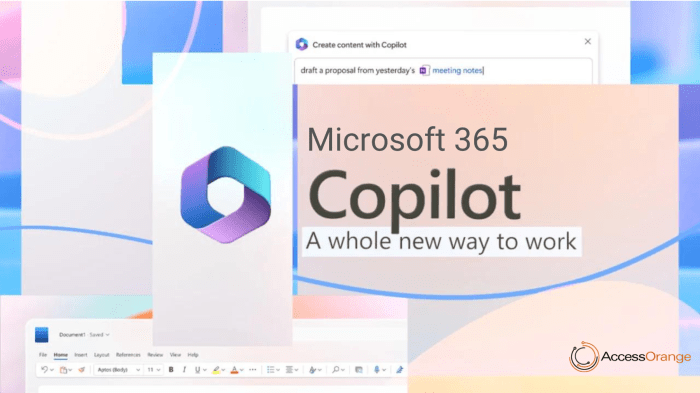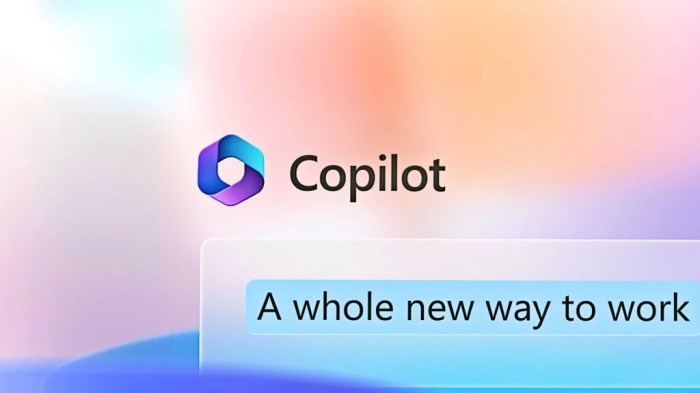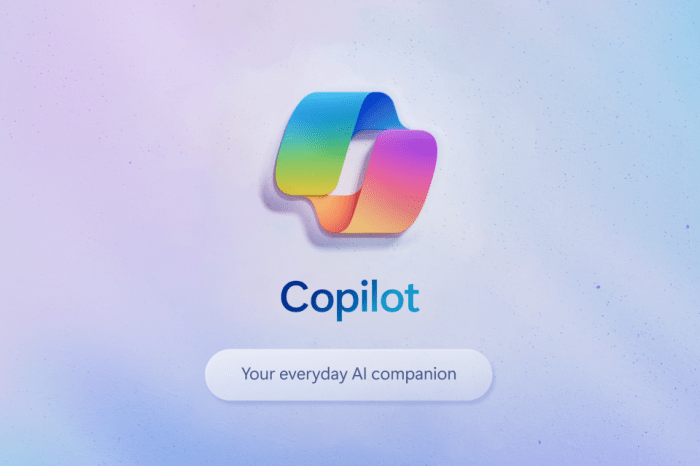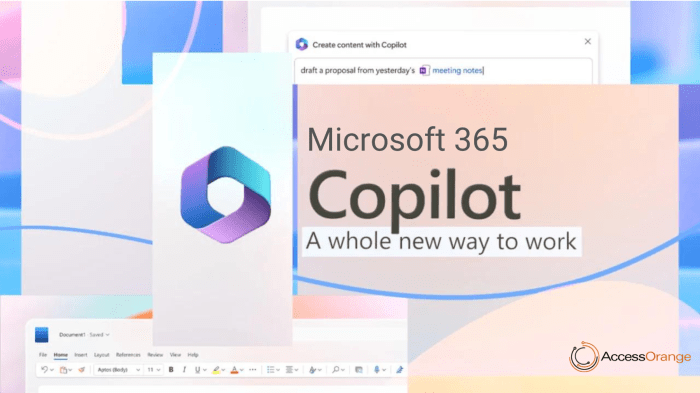
Microsoft Extends Copilot with Open Standard Plugins
Microsoft Extends Copilot with Open Standard Plugins, a move that promises to revolutionize how we interact with AI. This expansion opens up a world of possibilities for users, allowing them to tailor Copilot’s functionality to meet their specific needs.
By embracing open standards, Microsoft is creating an ecosystem where developers can build and share plugins, making Copilot even more powerful and versatile.
Imagine a future where Copilot can seamlessly integrate with your favorite tools and services, automating tasks and streamlining workflows in ways we’ve only dreamed of. This open plugin system empowers users to customize Copilot’s abilities, making it a truly personalized AI assistant that adapts to your unique requirements.
Microsoft Copilot

Microsoft Copilot is an AI-powered coding assistant that helps developers write better code faster. It leverages the power of large language models to understand code context and suggest relevant code snippets, functions, and even entire code blocks. This powerful tool can significantly improve developer productivity and efficiency, especially for repetitive or complex tasks.
Expanding Capabilities with Open Standard Plugins
Microsoft’s decision to extend Copilot with open standard plugins is a game-changer. This move opens the door for a vast ecosystem of plugins that can enhance Copilot’s functionality and cater to specific developer needs. The ability to integrate with external tools and services expands Copilot’s potential applications beyond just code generation.
Benefits and Potential Applications
The benefits of this expansion are numerous and far-reaching. Here are some key advantages:
- Increased Functionality:Plugins can extend Copilot’s capabilities to include tasks like code refactoring, security analysis, and code documentation. This allows developers to automate various aspects of their workflow, freeing up time for more complex and creative tasks.
- Improved Developer Experience:Plugins can tailor Copilot to specific development environments, frameworks, and programming languages. This customization enhances the developer experience by providing context-aware suggestions and assistance.
- Enhanced Integration:Open standards enable seamless integration with various tools and services, including version control systems, testing frameworks, and cloud platforms. This integration streamlines the development process and fosters a more collaborative environment.
The potential applications of this expansion are vast. Developers can leverage plugins to:
- Automate repetitive tasks:Plugins can automate code generation, code formatting, and other repetitive tasks, allowing developers to focus on higher-level design and problem-solving.
- Improve code quality:Plugins can help identify potential code vulnerabilities, enforce coding standards, and suggest improvements to code structure and readability.
- Speed up development:By automating tasks and providing intelligent suggestions, plugins can significantly accelerate the development process, enabling faster delivery of software products.
- Enhance collaboration:Plugins can facilitate code sharing, collaboration on projects, and seamless integration with existing workflows.
“The open standard approach to plugins is a key step in making Copilot a truly collaborative and extensible tool. This will empower developers to create custom solutions that meet their specific needs and drive innovation in the development ecosystem.”
Open Standard Plugins: Microsoft Extends Copilot With Open Standard Plugins
The introduction of open standard plugins marks a significant shift in the way we interact with AI tools like Microsoft Copilot. This paradigm shift empowers developers and users to extend Copilot’s functionality beyond its predefined capabilities, creating a truly customizable and adaptable AI experience.
Microsoft’s extension of Copilot with open standard plugins is a game-changer for productivity. This move opens the door for a vast array of integrations, including powerful office suites like the OfficeSuite Personal Plan Lifetime Subscription. Imagine a world where Copilot seamlessly interacts with your preferred office suite, automating tasks and streamlining your workflow.
This integration could revolutionize how we work, making collaboration and efficiency more accessible than ever before.
The Power of Open Standards
Open standard plugins offer several advantages over proprietary plugin systems. These advantages foster innovation, collaboration, and wider adoption:
- Interoperability:Open standards ensure that plugins developed by different parties can seamlessly integrate with Copilot, fostering a vibrant ecosystem of tools and extensions. This eliminates the need for developers to create separate plugins for each platform, promoting efficiency and reducing development costs.
- Transparency and Accessibility:Open standards are publicly available, allowing developers to understand how plugins interact with Copilot and contribute to its evolution. This transparency encourages community involvement and accelerates the development of new and innovative plugins.
- Competition and Innovation:Open standards foster competition among plugin developers, driving innovation and improving the quality of available tools. This competitive environment leads to better solutions and a wider range of functionalities for users.
Potential Plugin Categories
Open standard plugins can be categorized based on their intended functions. These categories highlight the vast potential of open standards to expand Copilot’s capabilities:
- Data Integration:Plugins can connect Copilot to various data sources, such as databases, APIs, and cloud services, enabling it to access and process real-time information. This allows Copilot to generate more accurate and relevant outputs based on specific data contexts.
- Domain-Specific Expertise:Plugins can specialize in specific domains, such as finance, healthcare, or law, providing Copilot with domain-specific knowledge and vocabulary. This allows Copilot to understand and generate text related to these specific fields, making it a more effective tool for professionals.
- Creative Tools:Plugins can extend Copilot’s creative capabilities, enabling it to generate different types of content, such as music, code, or visual designs. This opens up exciting possibilities for artists and creators to leverage AI in their creative processes.
- Workflow Automation:Plugins can automate tasks and workflows within Copilot, streamlining processes and increasing efficiency. This could involve integrating Copilot with existing tools and applications, automating repetitive tasks, and creating custom workflows based on user needs.
Plugin Development and Integration
Microsoft Copilot’s open standard plugin architecture empowers developers to extend its capabilities and create specialized tools tailored to specific workflows and domains. This section delves into the process of developing and integrating plugins with Microsoft Copilot, outlining technical considerations and best practices for plugin creation.
Plugin Development Process
Developing plugins for Microsoft Copilot involves several steps:
- Define Plugin Functionality:Clearly define the plugin’s purpose, target audience, and the specific tasks it should automate or enhance. This involves understanding the user’s needs and how the plugin will integrate with Copilot’s core functionality.
- Choose a Development Environment:Select a suitable development environment based on the plugin’s requirements. Microsoft provides comprehensive documentation and resources for developing plugins using various languages and frameworks, such as Python, JavaScript, and .NET.
- Implement Plugin Logic:Develop the core logic of the plugin, including functions for data processing, API interactions, and user interface elements. This step involves writing code that defines the plugin’s behavior and interactions with Copilot.
- Package and Deploy:Package the plugin into a deployable format, such as a ZIP file or a container image, and deploy it to a compatible platform or repository. Microsoft provides guidelines and tools for packaging and deploying plugins for seamless integration with Copilot.
Microsoft’s recent move to extend Copilot with open standard plugins is a huge step forward for AI development. It reminds me of how excited I am for the upcoming adaptation of William Gibson’s “Neuromancer” on Apple TV+, which has finally revealed some details , and the possibilities for immersive storytelling that these technologies will unlock.
I can’t wait to see how Copilot evolves with the power of open standards and how these innovations influence the future of entertainment.
- Test and Iterate:Thoroughly test the plugin to ensure its functionality, stability, and compatibility with Copilot. This involves testing various scenarios and user interactions to identify and address any issues or bugs. Continuous iteration and improvement are crucial for creating robust and reliable plugins.
Microsoft’s move to extend Copilot with open standard plugins is a smart move, opening up a world of possibilities for developers and users alike. Imagine a future where your Copilot can seamlessly access tools like password managers, such as those discussed in this article on password managers built teams , to securely manage your online identities.
This kind of integration could truly revolutionize the way we work and interact with technology.
Technical Considerations and Best Practices
Developing high-quality plugins requires considering several technical aspects and adhering to best practices:
- Security:Prioritize security in plugin development by implementing robust authentication, authorization, and data protection mechanisms. Ensure the plugin handles user data securely and complies with relevant privacy regulations.
- Performance:Optimize plugin performance to minimize latency and ensure a smooth user experience. This involves efficient code design, efficient resource utilization, and appropriate caching strategies.
- Scalability:Design plugins to handle increasing workloads and user demands. Consider using scalable infrastructure and load balancing techniques to ensure the plugin can handle high volumes of requests.
- User Experience:Focus on providing a user-friendly and intuitive experience. This involves clear documentation, easy-to-understand interfaces, and helpful error messages.
- Open Standards:Adhere to open standards and best practices for plugin development, ensuring compatibility and interoperability with Copilot and other systems. This promotes a thriving plugin ecosystem and facilitates seamless integration.
Plugin Development Resources and Documentation, Microsoft extends copilot with open standard plugins
Microsoft provides a wealth of resources and documentation to assist plugin developers:
| Resource | Description |
|---|---|
| Microsoft Copilot Plugin Documentation | Comprehensive guide on plugin development, including technical specifications, best practices, and API references. |
| Microsoft Copilot Developer Community | Platform for developers to connect, share knowledge, and seek assistance. |
| Plugin Development SDK | Software Development Kit (SDK) containing tools, libraries, and examples to facilitate plugin development. |
| Plugin Marketplace | Platform for developers to publish and distribute their plugins to a wider audience. |
Impact on Productivity and Innovation

The introduction of open standard plugins for Microsoft Copilot has the potential to revolutionize user productivity and foster unprecedented innovation. By enabling seamless integration with a wide range of third-party applications and services, these plugins can streamline workflows, enhance user experiences, and unlock new possibilities for Copilot’s capabilities.
Streamlined Workflows and Enhanced User Experiences
Open standard plugins can significantly streamline workflows by automating repetitive tasks and integrating with existing tools and platforms. For instance, a user could leverage a plugin for their project management software to automatically create tasks in Copilot based on meeting notes or emails.
This integration eliminates the need for manual data entry, saving time and reducing errors.
“Plugins can act as bridges between Copilot and other tools, creating a seamless flow of information and actions.”
Furthermore, plugins can enhance user experiences by providing access to specialized functionalities and data sources. A designer could utilize a plugin for a design platform to generate color palettes or layout suggestions directly within Copilot, simplifying the design process and inspiring creativity.
New Use Cases and Applications for Copilot
The open standard plugin ecosystem can drive the emergence of new use cases and applications for Copilot. Developers can create plugins that extend Copilot’s capabilities into specialized domains, such as financial analysis, scientific research, or legal documentation. For example, a financial analyst could use a plugin to analyze market trends, generate investment recommendations, or automate financial reporting tasks.
“The possibilities for plugin development are virtually limitless, enabling Copilot to become a versatile tool across diverse industries.”
This expansion of functionality will not only empower users in their respective fields but also contribute to the growth and adoption of Copilot as a central hub for knowledge work.
The Future of Copilot and Open Standards

The integration of Microsoft Copilot with open standards marks a significant step towards a future where AI-powered tools become seamlessly integrated into workflows. This integration not only opens up possibilities for greater customization and interoperability but also paves the way for a more collaborative and dynamic ecosystem of AI-powered tools.
Challenges and Opportunities of Expanding Plugin Ecosystems
The expansion of plugin ecosystems, while offering exciting possibilities, also presents certain challenges. These challenges need to be addressed to ensure the long-term success and sustainability of the Copilot ecosystem.
- Security and Privacy Concerns:As plugins become more sophisticated, ensuring their security and protecting user data becomes paramount. Robust security measures, including rigorous vetting processes and sandboxing environments, are crucial to mitigate potential risks.
- Interoperability and Compatibility:Maintaining compatibility and interoperability across different plugins and platforms is essential for a seamless user experience. Establishing clear standards and guidelines for plugin development will be crucial to avoid fragmentation and ensure smooth integration.
- Scalability and Management:Managing a growing ecosystem of plugins requires efficient infrastructure and robust management tools. Ensuring the scalability and reliability of the plugin platform will be essential to accommodate the increasing demand for new functionalities.
- Community Engagement and Collaboration:Fostering a vibrant and collaborative community of plugin developers is vital for the long-term success of the ecosystem. Open communication channels, developer resources, and support mechanisms are essential to encourage participation and innovation.
Potential Future Developments and Their Implications
The integration of Copilot with open standards opens the door to a range of exciting future developments. These developments have the potential to transform the way users interact with AI-powered tools and unlock new levels of productivity and innovation.







